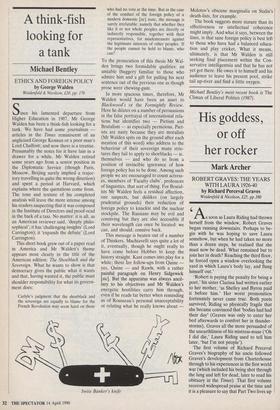A think-fish looking for a tank
Michael Bentley
ETHICS AND FOREIGN POLICY by George Walden
Weidenfeld & Nicolson, £20, pp. 176
Since his lamented departure from Higher Education in 1987, Mr George Walden has been a think-fish looking for a tank. We have had some journalism articles in the Times reminiscent of an anglicised George Kennan or a poor man's Lord Chalfont; and now there is a treatise. Presumably the notes for it have lain in a drawer for a while. Mr Walden retired some years ago from a senior position in the Diplomatic Service (though Paris, Moscow, Beijing surely implied a trajec- tory travelling in quite the wrong direction) and spent a period at Harvard, which explains where the quotations come from. The tone and texture of his completed analysis will leave the more intense among his readers suspecting that it was composed in the Institute of Directors and proof-read in the back of a taxi. No matter: it is all, as an American reviewer said, 'deeply philo- sophical'; it has 'challenging insights' (Lord Carrington); it 'expands the debate' (Lord Carrington).
This short book grew out of a paper read in America and Mr Walden's theme appears most clearly in the title of the American edition: The Shoeblack and the Sovereign. What he wants to show is that democracy gives the public what it wants and that, having wanted it, the public must shoulder responsibility for what its govern- ment does:
Carlyle's judgment that the shoeblack and the sovereign are equally to blame for the French Revolution may seem hard on those
who had no vote at the time. But in the case of the conduct of the foreign policy of a modern domestic [sic] state, the message is surely irrefutable: namely that whether they like it or not whole peoples are directly or indirectly responsible, together with their representatives, for misdemeanors against the legitimate interests of other peoples. If the people cannot be held to blame, who can?
To the prosecution of this thesis Mr Wal- den brings two formidable qualities: an amiable thuggery familiar to those who admire him and a gift for pulling his next sentence out of the previous one as though prose were chewing-gum.
In more spacious times, therefore, Mr Walden would have been an asset to Blackwood's or the Fortnightly Review. Here he dilates on a number of persuasions in the false portrayal of international rela- tions but identifies two — Pietism and Brutalism — as especially pernicious. Piet- ists are nasty because they are moralists (Mr Walden spits on the ground after each mention of this word) who address to the behaviour of their sovereign many stric- tures they fail to apply to shoeblacks — ie. themselves — and who do so from a position of invincible ignorance of how foreign policy has to be done. Among such people we are encouraged to count actress- es, members of 'Faculty clubs', professors of linguistics, that sort of thing. For Brutal- ists Mr Walden feels a residual affection, one suspects, but dislikes (on largely prudential grounds) their reduction of foreign policy to knuckle and the nuclear stockpile. The Russians may be evil and conniving but they are also accessible if their wavelength can once be located: we can, and should, connive back.
This message is beaten out of a number of Thinkers. Machiavelli says quite a lot of it, eventually, though he ought really to have come before Hobbes to keep the history straight. Kant comes into play for a while; there 'are follow-ups from Quine yes, Quine — and Rawls, with a rather painful paragraph on Henry Sidgewick [sic]. But the apparatus was always ancil- lary to his objectives and Mr Walden's energetic hostilities carry him through, even if he reads far better when reminding us of Rousseau's personal unacceptability or relating what he really knows about — Swiss Banker's knife Molotov's obscene marginalia on Stalin's death-lists, for example.
The book suggests more stature than its effectiveness or intellectual coherence might imply. And what it says, between the lines, is that sane foreign policy is best left to those who have had a balanced educa- tion and play cricket. What it means, ultimately, is that Mr Walden is still seeking final placement within the Con- servative intelligentsia and that he has not yet got there. He owes it to himself and his audience to leave his present pool, strike tail up-river and find a little oxygen.
Michael Bentley's most recent book is The Climax of Liberal Politics (1987).


















































 Previous page
Previous page